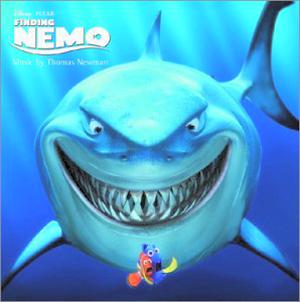Finding Nemo
Music composed by Thomas Newman
Orchestrations by Thomas Pasatieri
Dialogue voices by Ellen DeGeneres, Brad Garrett, Stephen Root and Austin Pendleton
Beyond The Sea performed by Robbie Williams
Available from Walt Disney Records 60078-7
Running time: 60.23
Amazon US

Following four Pixar digital animated features scored by Randy Newman (Toy Story, A Bug’s Life, Toy Story 2 & Monsters Inc.), along comes a fifth with music by cousin Thomas. The result is a lavishly scored, and by all accounts charming film, which has generated an album more typical of the complete or expanded type of soundtrack release aimed at the collector, rather than the mainstream pop-filled "music from and inspired by" discs we have come to expect from such family orientated blockbuster fare.
I have written about how the soundtrack market has changed in my review this month of the reissued soundtrack for The Dark Crystal, how 20 years ago a 40 minute disc reworking the score into something more listenable for a general audience once divorced from the film was the norm, while now film music fans often demand every last note, however musically fragmented and repetitive the result may be. For Finding Nemo we are treated, seemingly, to every last note, albeit augmented by a few very brief dialogue excerpts and some occasional watery sounds. Not to worry, as even a confirmed dialogue-on-record-hater such as myself found these intrusions so minimal that they really do add a flavour of the film without being intrusive or spoiling the music. And it is useful to have some flavour of the film while listening to this release, partly because there are no really memorable tunes, but largely because, perhaps appropriately given that this is a Pixar/Disney co-production, substantial parts of the score depend on the oft reviled old film music technique of "Mickey Mousing" – musically mimicking the on-screen action in music down to the last 24th of a second.
In an animated family film such as Finding Nemo this "Mickey Mouse" music approach is doubtless what is required, and is presumably carried out with a certain amount of post-modern irony by Thomas Newman – how could the composer of American Beauty, The Green Mile and The Road to Perdition not have his tongue partly in his cheek whilst scoring the comic adventures of a pair of fish? On disc though it does lead to the musical equivalent of multiple personality disorder, sometimes the changes from comic to ethnic pastiche to cod-dramatic lasting only a matter of seconds before something else comes along. Everything and the kitchen sink really is here, from the rhythmically infectious "Field Trip" to the frantic menace of "Friends Not Food" through to cues which suggest either the world of American football, or a Lalo Schfrin Mission: Impossible spoof. The cue "Drill" even tosses in a direct, and acknowledged, quotation from "The Girl From Impanema".
By turns lush and soaring, cute and playful, this is a highly inventive and resourceful score, only occasionally resorting to Thomas Newman’s by now vastly over-familiar post American Beauty rhythmic trademarks. He does trot out his usual array of electric instrumentation, but this time, as with The Salton Sea, does something fresh with it. Hold your breath, on Finding Nemo you will find: Tahitian uke/banjo, bajo sexto, lyre, bowed bass dulcimer, baritone electric, jeep rims, panderio, cajon, dayre, metal sculptures, randomised brass, pro scratch 1, live 2.0, Waldorf Wave, Axis 8, Mo-FX, Repeater, various electric organs, prepared piano, processed flutes and clarinets, Bigsby lap steel, water and fin. The composer plays the piano.
Recorded with the best production values Hollywood can buy, the whole thing sounds fabulous, and even if you don’t particularly like the music, it will certainly give your hi-fi a serious workout. It’s a fun disc, woven together like an ingenious musical tapestry. The forty tracks flow together, if not seamlessly – that is not going to happen give the diverse nature of the writing – then effortlessly. Playing them all at once is a little exhausting, but then no one says you have to. Even the end title song, Robbie Williams doing his best Frank Sinatra impression singing the old Bobby Darin hit "Beyond The Sea" is many cuts ahead of the usual pop plastered across the end of modern features. Most enjoyable, and one for real film music enthusiasts rather than the chart audience.
Gary Dalkin
31/2
Return to Index